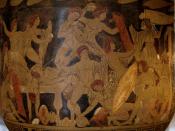The majority of the Odyssey is an account of Odysseus' adventures (or, rather, misadventures) trying to reach his homeland of Ithaka. Several of these adventures are false homecomings, the most prominent of which is his imprisonment on Kalypso's island. This false homecoming is strikingly different from what one would expect of Odysseus' real homecoming, but similar enough for parallels to be drawn between the two. Homer uses this false homecoming to foreshadow Odysseus' true homecoming.
Throughout the Odyssey, Homer presents the reader with certain clues about what Odysseus feels his homecoming should (but not neccessarily will) be like. First of all, Odysseus wants to return to Ithaka. Homer goes as far as having Odysseus describe Ithaka: 'There is a mountain there that stands tall, leaf-trembling Neritos, and there are islands settled around it, lying one very close to another. There is Doulichion and Same, wooded Zakynthos, but my island lies low and away, last of all on the water...'
(Bk. 9, ln. 21-25). Kalypso lives on island, which may indeed resemble Ithaka. In this way, Homer begins to alert the reader that this scene may be a false homecoming. But, simply the fact that Kalypso lives on an island is not enough evidence to draw the conclusion that this may foreshadow Odysseus's true homecoming. Other evidence is needed, and Homer provides it for us. Odysseus expects to return to his family and to the way of life which he is accustomed to. For the most part, Kalypso treats him as he is used to being treated--there is a certain sense of familiarity here. Returning from ten years of war with Troy and at least several years at sea, Odysseus wants to return to the comfort of home. Her cave has '...a great fire blazing on...



Beautiful
Very well written paper. Wow
2 out of 5 people found this comment useful.